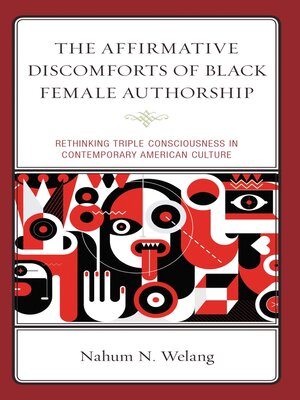The Affirmative Discomforts of Black Female Authorship
ebook ∣ Rethinking Triple Consciousness in Contemporary American Culture
By Nahum N. Welang

Sign up to save your library
With an OverDrive account, you can save your favorite libraries for at-a-glance information about availability. Find out more about OverDrive accounts.
Find this title in Libby, the library reading app by OverDrive.



Search for a digital library with this title
Title found at these libraries:
| Library Name | Distance |
|---|---|
| Loading... |
Ubiquitous triple consciousness frameworks address the limitations of W.E.B Du Bois' seminal double consciousness concept by emphasizing a third gendered lens, a definite consciousness that legitimizes the rich complexities of the black American female experience.
In The Affirmative Discomforts of Black Female Authorship: Rethinking Triple Consciousness in Contemporary American Culture, the author rethinks this methodology by examining an interesting assemblage of contemporary black female authors (Roxane Gay, Beyoncé and Issa Rae) across four disciplines (history, literature, music and television) whose contemporary multimedia works are engaging with a third lens the author conceptualizes as rupture.
This rupture, a simultaneous embrace and rejection of racial and gendered experiences that are affirmative but also contradictory, unsettling and ultimately unresolved, problematizes hegemonic notions of identity and boldly moves towards a potential shift, a shift on the cusp of profound rethinking and reimagination.
In The Affirmative Discomforts of Black Female Authorship: Rethinking Triple Consciousness in Contemporary American Culture, the author rethinks this methodology by examining an interesting assemblage of contemporary black female authors (Roxane Gay, Beyoncé and Issa Rae) across four disciplines (history, literature, music and television) whose contemporary multimedia works are engaging with a third lens the author conceptualizes as rupture.
This rupture, a simultaneous embrace and rejection of racial and gendered experiences that are affirmative but also contradictory, unsettling and ultimately unresolved, problematizes hegemonic notions of identity and boldly moves towards a potential shift, a shift on the cusp of profound rethinking and reimagination.







